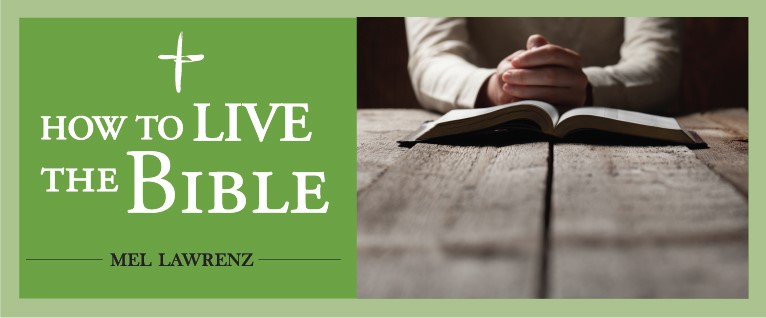
This is the sixty-ninth lesson in author and pastor Mel Lawrenz’ How to Live the Bible series. If you know someone or a group who would like to follow along on this journey through Scripture, they can get more info and sign up to receive these essays via email here.
See Mel Lawrenz’s book, How to Study the Bible: A Practical Guide.
I am glad when I have the opportunity to speak with people who have doubts about their faith. Don’t get me wrong—I’m not glad about the pain they experience in one of the most intimate issues of life. And that pain can be intense—like that felt by a husband or wife who overhears whispering hints that his or her spouse has been cheating. Or like the pain that follows the death of a loved one. Conversations with people who doubt are often halting, quiet, scattered. I have never met someone of faith who wanted to have doubts about their faith, because it really isn’t about doubting faith—it’s about doubting God.

For many, doubt is like driving into a fog. You didn’t see it coming, but now you’re in it. You don’t know how to get out of it, you don’t know what way to turn, and you don’t even remember exactly where you were when you got into it. You didn’t ask for the fog—it’s just how things are.
The reason I say I’m glad for those conversations is that it is better for someone experiencing doubt to talk to someone than to let doubt fester. Like grief, doubt itself does not injure; it is often the result of injury. Most important to know is the fact that our doubts do not injure God, because nothing can injure God. It is possible to insult God—because any of us are capable of disrespect—but apparently doubt in the form of sincere questioning is not an insult to God. The Bible never says that the moment we waver, God is ready to cut us off.
But ultimately the question we need to answer is: How are we going to deal with doubt? The answer is different for the habitual doubt of the utter skeptic and the passing doubt of the believer who has been tossed into uncertainty because of a life crisis. But in either case, the only effective response to doubt is to get rooted in real faith.
There is a passionate plea in the middle of the book of Colossians in the New Testament, in which the apostle Paul says:
Just as you received Christ Jesus as Lord, continue to live [literally, “walk”] in him, rooted and built up in him, strengthened in the faith as you were taught, and overflowing with thankfulness.
See to it that no one takes you captive through hollow and deceptive philosophy, which depends on human tradition and the basic principles of this world rather than on Christ.
For in Christ all the fullness of the Deity lives in bodily form, and you have been given fullness in Christ, who is the head over every power and authority (vv. 6-10).
There is nothing better that can happen to a person in life than to come to the place of saying “I believe.” It is like someone turns the lights on, or better yet, the day has dawned and the confusion and oppression of the darkness of life has been pushed back.
We want to believe because without faith all we’re left with is a gigantic question mark about the meaning and purpose of life, no real hope for the future, and no assurance that we are loved by anyone beyond passing human affection. Without faith we are cut off from our Creator, and consequently, we are cut off from what He has created. All of life becomes disjointed. It is like sitting on a stool where two of the three legs have become loose and the whole thing could collapse at any moment.
If we want to believe, then we need to realize that faith doesn’t happen in a moment; it is a lifelong walk. Those who receive Jesus as Lord need to begin and continue a walk with him. When you put these two ideas together—receiving and walking—you get a total picture of faith. It is not just walking, as if it were up to us to go on a great quest in order to find God who is hidden up high in the mountains somewhere; but neither is it only receiving, which would be like repeating vows in a wedding ceremony but not following through with marital commitment.
Many believers are fond of speaking in terms of “receiving” Christ, and that is biblical, as we see in the passage from Colossians. But it is only one way of describing the reality of faith. And it is important that we realize just how serious this receiving is. It is not merely saying the right words or praying the right prayer as if they were some kind of incantation. While it is true that the front end of receiving the Lord Jesus is a simple admission of need—a plea for mercy, an opening of heart and hands—we should realize that receiving a lord means to give up one’s own lordship of life. (And we would do well to eliminate from our vocabulary the phrase “making Christ Lord.” We don’t make Him anything. He is Lord, whether we acknowledge it or not.)
___________
For more on this subject, see I Want to Believe: Finding Your Way in an Age of Many Faiths by Mel Lawrenz.
___________
[If you believe this series will be helpful, this is the perfect time to forward this to a friend, a group, or a congregation, and tell them they too may sign up for the weekly emails here]
Mel Lawrenz (@MelLawrenz) trains an international network of Christian leaders, ministry pioneers, and thought-leaders. He served as senior pastor of Elmbrook Church in Brookfield, Wisconsin, for ten years and now serves as Elmbrook’s minister at large. He has a PhD in the history of Christian thought and is on the adjunct faculty of Trinity International University. Mel is the author of 18 books, including How to Understand the Bible—A Simple Guide and Spiritual Influence: the Hidden Power Behind Leadership (Zondervan, 2012). See more of Mel’s writing at WordWay.
The post How to Live the Bible — Dealing with Doubts appeared first on Bible Gateway Blog.











